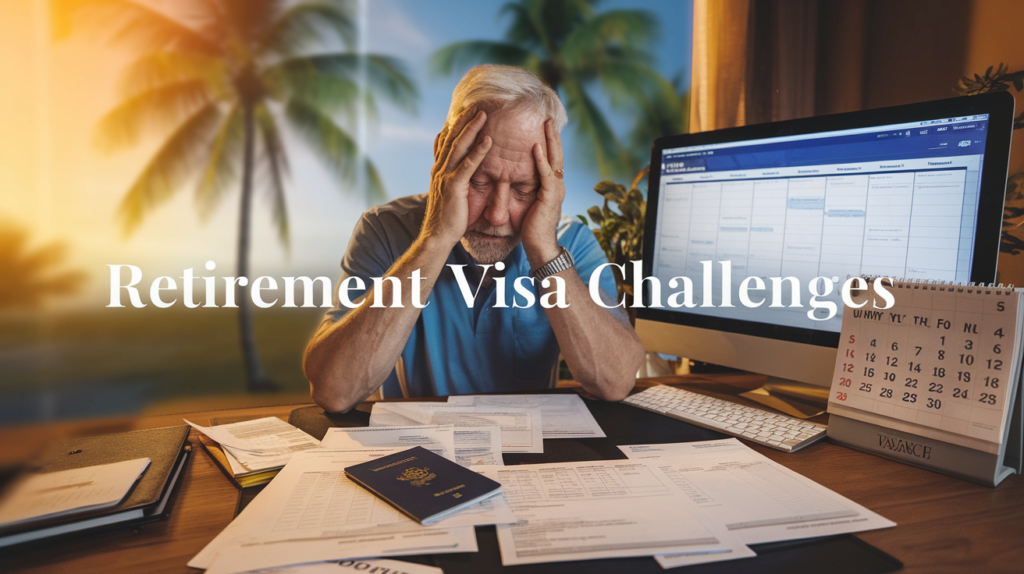Dreaming of a blissful retirement in a foreign paradise? 🌴✈️ For many, it’s the ultimate goal. But what happens when that dream crashes into the harsh reality of a rejected retirement visa? It’s a scenario that’s all too common, leaving would-be expats frustrated and bewildered.
Why do retirement visa applications get rejected? The reasons are numerous, from financial shortfalls to overlooked paperwork. Each year, countless retirees face disappointment due to avoidable mistakes in their visa applications. But here’s the good news: with the right knowledge and preparation, you can significantly increase your chances of approval.
In this comprehensive guide, we’ll explore the seven most common reasons for retirement visa rejections and provide you with actionable strategies to overcome them. Whether you’re concerned about meeting financial requirements, navigating health insurance policies, or ensuring your documentation is spotless, we’ve got you covered. Let’s embark on this journey to turn your retirement dreams into reality, one visa application at a time. 🏝️🛂
Financial Requirements: Understanding and Meeting Them

A. Minimum income thresholds
Retirement visa applications often hinge on meeting specific income requirements. These thresholds vary by country, typically ranging from $1,500 to $3,000 per month. It’s crucial to research and understand these requirements well in advance.
| Country | Monthly Income Threshold |
|---|---|
| Thailand | $2,000 |
| Malaysia | $2,500 |
| Portugal | €1,300 |
B. Proof of regular pension or investment income
- Social Security statements
- Pension fund documents
- Investment portfolio statements
- Rental income records
Providing comprehensive evidence of steady income is essential for a successful application.
Health Insurance Coverage: A Critical Factor

Mandatory health insurance requirements
Health insurance is a critical component of retirement visa applications. Most countries require applicants to have comprehensive coverage that meets specific criteria:
- Minimum coverage amount
- Inpatient and outpatient care
- Emergency medical evacuation
- Repatriation of remains
Adequate coverage levels
Coverage levels must typically meet or exceed:
| Type of Care | Minimum Coverage |
|---|---|
| Inpatient | $50,000 annually |
| Outpatient | $10,000 annually |
| Emergency | $10,000 per event |
Insufficient coverage can lead to visa rejection, highlighting the importance of thorough research and proper planning when selecting a health insurance policy for retirement abroad.
Criminal Background Checks: Ensuring a Clean Record

Types of background checks required
- Police clearance certificate
- Criminal record check
- Security vetting
| Check Type | Purpose | Typical Validity |
|---|---|---|
| Police clearance | Verify no local criminal record | 6 months |
| Criminal record | Check for international offenses | 12 months |
| Security vetting | In-depth background screening | 24 months |
Dealing with minor offenses
Minor offenses don’t always lead to rejection. Transparency is key. Disclose all incidents, even if expunged. Provide context and evidence of rehabilitation. Some countries have specific thresholds for acceptable offenses. Research these criteria and prepare explanations if needed.
Incomplete or Inaccurate Documentation

Essential documents for retirement visa applications
- Passport (valid for at least 6 months)
- Proof of income or pension
- Bank statements
- Health insurance certificate
- Police clearance certificate
- Visa application form
Common errors in form filling
Applicants often make mistakes when filling out retirement visa forms. These errors can lead to delays or rejections. Pay close attention to details, double-check all information, and ensure consistency across all documents. Seek professional help if unsure about any part of the application process.
Misunderstanding Visa Conditions and Restrictions

Length of stay requirements
Retirement visas often come with specific length of stay requirements. Typically, retirees must spend a minimum number of days in the country each year to maintain their visa status. Failure to meet these requirements can lead to visa rejection or revocation.
| Requirement | Common Duration |
|---|---|
| Minimum stay | 180-270 days/year |
| Consecutive absence | 90-180 days max |
Renewal processes and deadlines
Timely visa renewals are crucial for maintaining legal status. Many retirees overlook renewal deadlines or underestimate the time needed for the process. It’s essential to start the renewal well in advance and understand all required documentation to avoid last-minute complications or visa rejections.
Health and Medical Issues: Meeting Standards

Required medical examinations
Most countries require retirees to undergo medical examinations as part of the visa application process. These typically include:
- General health check-up
- Chest X-ray
- Blood tests
- TB screening
| Examination | Purpose |
|---|---|
| General check-up | Overall health assessment |
| Chest X-ray | Detect lung diseases |
| Blood tests | Screen for various conditions |
| TB screening | Identify tuberculosis |
Dealing with pre-existing conditions
Pre-existing conditions can affect your visa application. Be transparent about your health history and provide documentation from your doctor. Some countries may require additional medical clearance or proof of treatment plans for certain conditions.
Timing and Planning: Avoiding Last-Minute Rush

Ideal application timeframes
Applying for a retirement visa requires careful timing. Start the process at least 6 months before your planned move. This allows ample time for:
- Gathering necessary documents
- Obtaining medical clearances
- Completing financial verifications
- Addressing any unforeseen issues
Seasonal variations in processing times
| Season | Processing Time |
|---|---|
| Summer | 4-6 weeks |
| Winter | 6-8 weeks |
Processing times often increase during peak travel seasons. Winter months typically see longer wait times due to holiday closures and increased applications.

Navigating the retirement visa application process can be complex, but understanding common pitfalls can significantly increase your chances of success. By ensuring you meet financial requirements, have adequate health insurance coverage, and maintain a clean criminal record, you’re already on the right track. Pay close attention to documentation accuracy, visa conditions, and health standards. Additionally, proper timing and planning are crucial to avoid last-minute complications.
Remember, a successful retirement visa application is your gateway to a new chapter in life. Take the time to thoroughly research and prepare for each aspect of the process. If you’re unsure about any requirements or have concerns, don’t hesitate to seek professional advice. With careful preparation and attention to detail, you can overcome potential obstacles and embark on your retirement journey with confidence.

